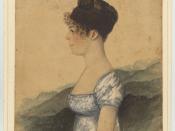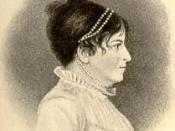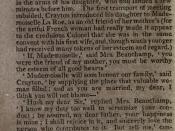The character of Charlotte, in the book by Susanna Rowson's "Charlotte Temple", is seemingly naïve and in need of direction and protection from the world she lives in. She suffers a tragic fate for following a misguided path lead by Mademoiselle La Rue, her teacher whom Charlotte trusts. Mademoiselle La Rue is characterized as a woman who deliberately sends this young naïve girl into the arms of a man without thought or principal of the outcomes that lead to such dangers during this time period. Possibly Charlotte, who was raised in a Christian home, should have already known what is right and what is wrong; Mademoiselle La Rue would have only been an accomplice to helping Charlotte acquire what she already wanted which was to obtain her love interest Montraville. Aside from all the main characters' motivations that were either right or wrong in the eyes of society, Charlotte's fate was destined to happen because of her own careless mistakes caused by not trusting in her family and the lack of experience she had dealing with men and not by the fact that Mademoiselle La Rue misguided her intentionally.
If feminism, in part, is described as a female taking an initiative in her life and promoting self-interest, then Charlotte certainly warranted this in her own life. Perhaps the concept of being a feminist concerning Charlotte's character wasn't in the mind of the readership but unquestionably she challenges that notion. (Yarbrough 1-3) For example, at the end of chapter one when Montraville slips a note into Charlotte's hand, she accepts it. This acceptance notes that if Charlotte was uncomfortable with Montraville at all she would have not accepted the note at all. She would have torn it or disposed of it in some way. No amount of encouragement...


